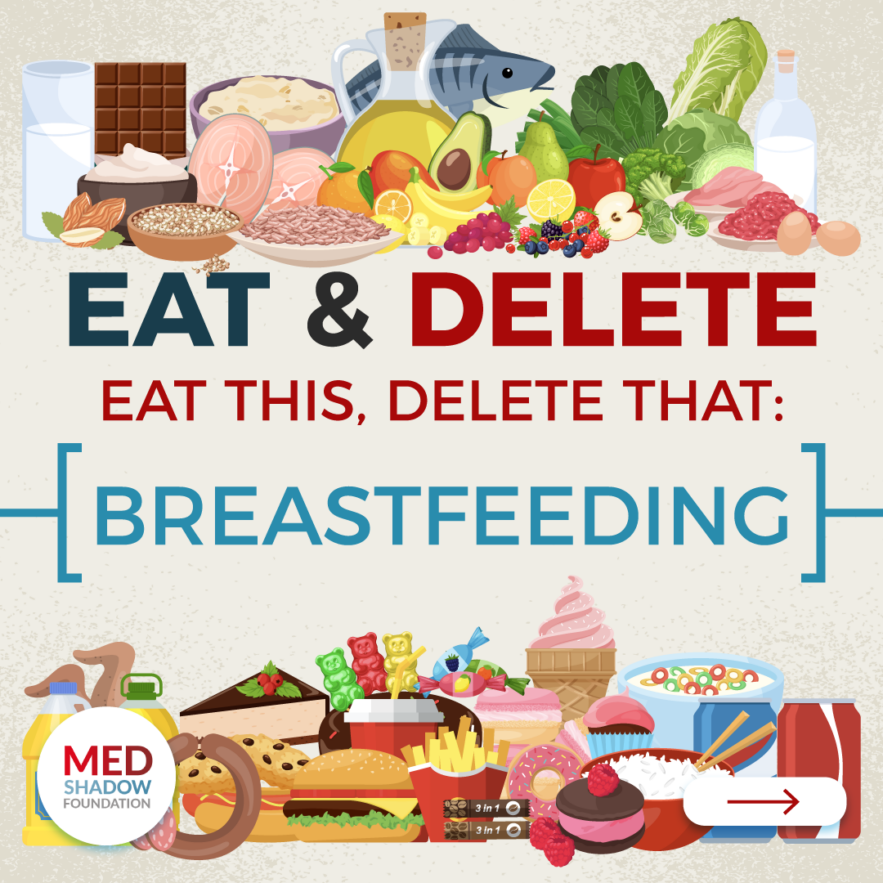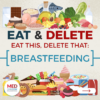Becoming a new parent can be a scary and confusing time. There are so many choices to make, and nearly everyone you know from your pastor to your parents will have tips and advice to follow. Fortunately, or perhaps unfortunately, it is up to you to decide what is best for your baby.
If you’ve chosen to breastfeed, congratulations. Such feeding can greatly improve the health of your child, with benefits ranging from a reduction in future allergies, to added immunities passed from mother to child.
If you’ve chosen not to breastfeed, that’s is OK, too. It is your body, your choice, and your child. Don’t feel pressured to do something you are uncomfortable with overall.
Remember, if you have chosen to nurse your baby, there are tips to follow a solid diet to both keep you and the baby healthy and happy. Let’s explore some advice offered by our MedShadow Foundation medical advisory board member and registered dietitian, Alyson Acerra, MS, RDN.
1. Maintain a Balanced Diet
Just like during your pregnancy, it is important to remember that anything that you put into your body can also potentially transfer to your child through breast milk. While some medications and nutrients may or may not break through to the milk, it is crucial to maintain a healthy diet throughout your nursing time.
“To get enough of these nutrients, choose protein-rich foods at each meal such as wild, sustainably-sourced fish, poultry, and meats, and vegetarian options like tofu and tempeh,” says Acerra.
Besides protein, you also want to get enough carbs. Did you know that nursing can burn around 500 calories per day? You’ll want to maintain your intake of calories to be sure you aren’t drained too quickly each day. New moms need all the energy they can get.
“Be sure to include fiber-rich carbohydrates such as fruits, vegetables, starchy vegetables, and whole grains,” says Acerra. Choosing these healthy options for your carbs can help you to lose that baby weight, while still providing your baby with the nutrients necessary!
And nursing your baby doesn’t mean you have to alter your vegetarian diet, if you so choose.
“If you follow a vegetarian diet, it’s especially important to choose foods that’ll give you the nutrients you need,” says Acerra. She suggests foods rich in iron, protein, and calcium, such as milk, yogurt, and eggs. If you are vegan, beans and legumes, healthy oils (such as olive oil), avocados, nuts, and seeds also contain necessary nutrients for both mom and child.

2. Understand the Nutrition of Breastmilk
Another important aspect to understanding diet during nursing is not only what mom is eating, but also your baby. As your baby breastfeeds, they get a different amount and quality of milk. While the nutrients in breastmilk can sustain a baby through the first six months, it is important to know how the milk flows.
“Early in the feeding, the milk is more watery and meets your baby’s hydration needs,” explains Acerra. “Later, you will begin producing your ‘hindmilk,’ which is more nutrient- and calorically-dense.”
To ensure that nutrients of the hindmilk are completely received, it is best to understand the feeding process, especially rotating sides.
“Be sure your baby empties one breast before moving on to another,” says Acerra.
3. Incorporate Supplements as Needed
If you are concerned about the amount of nutrients in your daily diet, it is smart to discuss with your healthcare provider possible supplements that you may need to add.
There are three key nutrients that Acerra says are key to keep an eye on, as many moms struggle to get enough of into their daily foods.
“Omega-3 fatty acids are important for your baby’s brain development,” says Acerra.
Additionally, some nutrients benefit both mom and child. They are just as crucial for both involved!
“Vitamin D and calcium protect mom’s bones and support both mom and baby’s nutrient reserves,” says Acerra.
If you are not one who eats meat, you may have different priorities for the supplements needed.
“For vegetarians, Vitamin B-12 is important and deficiency is related to developmental delays in baby,” she says.
4. Foods to Avoid
Sometimes the foods you SHOULDN’T eat are just as crucial as the foods you SHOULD. Acerra says that referring back to your pregnancy tips is a good method to consider for nursing, too. Similar “dos” and “don’ts” apply to a nursing mom.
Acerra says to avoid “caffeine, processed foods, alcohol and mercury-rich fish” when nursing. Mercury-rich fish often include “typically larger fish like tuna, swordfish, shark, marlin, sea bream, and sea bass,” she says.






